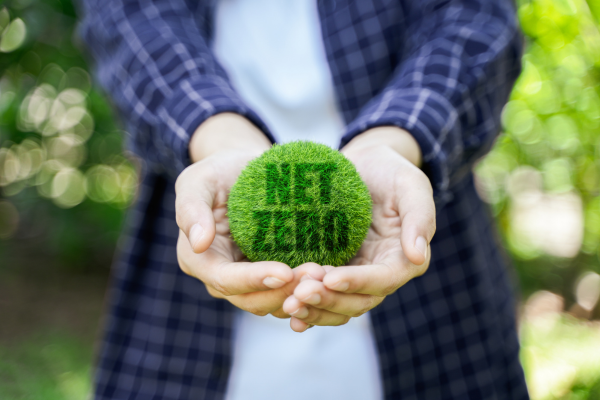In case you missed it see what’s in this section
Let's Talk

Rising Adoption of 'Net-Zero' Climate Goals by Companies, Yet Credible Plans Remain Sparse, Reveals Report
A rising number of companies, including Lottoland online casino, are committing to reduce their greenhouse gas emissions to "net zero" in alignment with global initiatives to address climate change. However, a recent report published on Monday indicates that these commitments often lack a credible plan.
The concept of net zero involves halting the addition of planet-warming gases to the atmosphere, achieved either by preventing emissions initially or offsetting an equivalent amount through natural or technological methods. Scientists emphasize the urgency of reaching net-zero emissions by 2050 to cap global warming at 1.5 degrees Celsius (2.7 degrees Fahrenheit) compared to pre-industrial levels.
The momentum behind the net-zero goal has increased in recent years. While 149 countries have adopted such targets, up from 124 in late 2020, the number of publicly listed corporations pursuing net zero has surged from 417 to 929, as revealed in the Net Zero Stocktake report compiled by experts from four independent research organizations.
Unlike national targets, the criteria for net-zero initiatives at the sub-national or company level lack a clear definition. To address this, the authors employed a basic checklist inspired by the United Nations campaign, Race to Zero. This involves establishing interim targets and encompassing all emissions within a company's responsibility, including those associated with the use of its products.
According to Kuramochi, a senior climate policy researcher at the Germany-based NewClimate Institute, less than 5% of the scrutinized companies met the criteria. Many companies have faced scrutiny for questionable environmental claims, especially in the fossil fuel sector, where accusations of greenwashing arise due to the exclusion of certain emissions—such as those from consumer burning of oil and gas—from their reported figures.
In June 2023, Britain’s Advertising Standards Authority took action against the Spanish oil and gas company Repsol for an advertisement about its net-zero plans, deeming it "likely to mislead" consumers. A similar complaint against energy giant Shell was upheld, as the ads failed to transparently convey the extent to which the company's business contributes to high emissions.
Kuramochi asserted that forthcoming years would likely witness a surge in independent research uncovering deceptive or overtly misleading climate claims. Anticipating a rise in litigation cases, he believed that companies could enhance their impact by promptly prioritizing substantial emissions reductions rather than resorting to inventive accounting methods to meet net-zero objectives. Kuramochi suggested that a commitment to more rigorous and transparent targets would prove more beneficial than engaging in greenwashing practices under the guise of pursuing net-zero goals.
The report, crafted by experts from the Energy and Climate Intelligence Unit at the University of North Carolina’s Data-Driven EnviroLab, along with contributions from the NewClimate Institute and Oxford Net Zero, is a significant contribution. This research comes in the wake of a distinct peer-reviewed study published last June in the journal Science, which cast doubts on the credibility of net-zero targets at the national level.
The authors of this report caution against accepting government pledges uncritically, as doing so may lead to an overestimation of the likelihood of capping global warming at 1.5 degrees Celsius. Factoring in current policies and only considering net-zero targets labelled as "high confidence" indicates a trajectory resulting in the world being 2.4 degrees (4.3 degrees Fahrenheit) warmer than the late-19th century average. This, in turn, would significantly amplify the adverse impacts of climate change.
Released concurrently with U.N. climate talks in Bonn, Germany, involving negotiators from almost 200 countries, the study proposes that national net-zero plans should be legally mandated, articulate a clear path with immediate objectives, and incorporate sector-specific goals.
FAQs
What is net zero?
In essence, achieving net zero involves minimizing greenhouse gas emissions as much as feasible, and any residual emissions are offset through absorption by natural elements such as oceans and forests.
Why is net zero crucial?
Scientific evidence underscores the imperative to cap global temperature rise at 1.5°C above pre-industrial levels to mitigate severe climate impacts and maintain a habitable Earth. The planet is approximately 1.1°C warmer than in the late 1800s, with ongoing emissions escalation. Adhering to the Paris Agreement's target requires a 45% reduction in emissions by 2030 and achieving net zero emissions by 2050.
Is there a global effort to reach net zero?
Indeed, an expanding alliance comprising nations, cities, businesses, and various institutions is committing to achieving net-zero emissions. Over 140 countries, encompassing major contributors like the United States, the European Union, China, and India have established net-zero targets, containing roughly 88% of global emissions. Additionally, more than 9,000 companies, 1000 cities, over 1000 educational institutions, and over 600 financial institutions have enlisted in the Race to Zero, vowing to implement decisive and prompt measures to cut global emissions by 50% by 2030.
How do we ensure commitments are turned into action?
The surge in net-zero commitments has led to the emergence of diverse criteria varying in their levels of solidity. In March 2022, António Guterres, the U.N. Secretary-General, established a High-Level Expert Group on the Net-Zero Emissions Commitments of Non-State Entities to enhance and clarify standards for pledges made by entities such as businesses, investors, cities, and regions. The group aimed to expedite the implementation of these commitments. On 8 November 2022, during COP27, the Expert Group unveiled its recommendations.
Are we on track to reach net zero by 2050?
Regrettably, the commitments made by governments so far fall considerably short of the necessary actions. The current collective climate plans of 195 Paris Agreement Parties would result in a substantial rise of nearly 9% in global greenhouse gas emissions by 2030, relative to 2010. To adhere to the Paris Agreement's stipulation of limiting global warming to 1.5°C, emissions must be reduced by 45% by 2030, ultimately reaching net zero by 2050. Achieving net zero demands that all governments, particularly the major emitters, substantially enhance their Nationally Determined Contributions (NDCs) and promptly undertake decisive measures to cut emissions.
Weather in Swindon
Listings



















